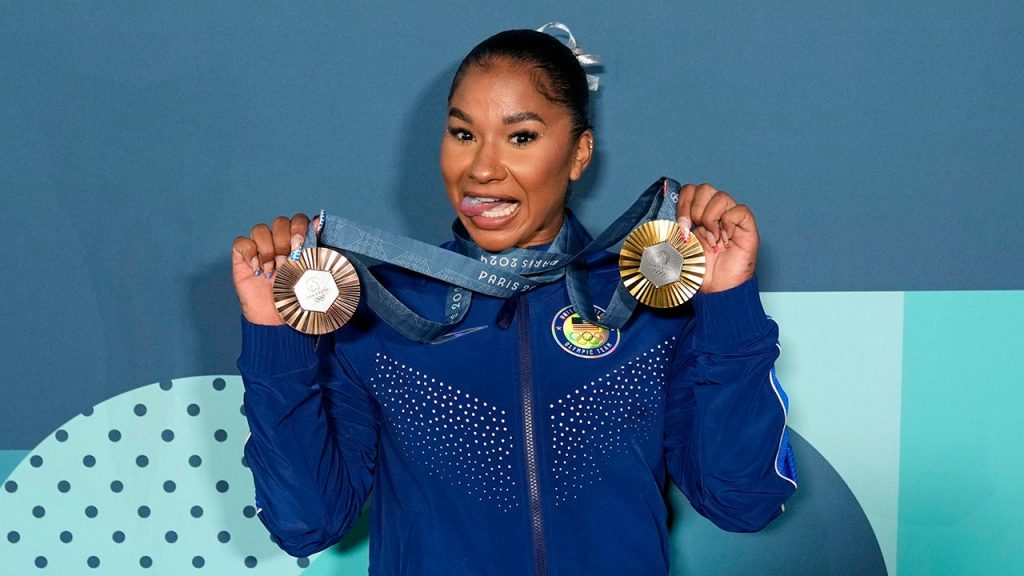The 2024 Paris Olympics should have been a moment of triumph for American gymnast Jordan Chiles. She contributed to Team USA’s gold medal win in the women’s team event and initially secured an individual bronze medal in the floor exercise final, a result that marked a historic first: an all-Black podium in Olympic gymnastics. However, this achievement was soon overshadowed by controversy and a protracted legal battle that continues to unfold. Chiles’s bronze medal was subsequently stripped from her by the Court of Arbitration for Sport (CAS) following a Romanian appeal, sparking outrage and raising questions about fairness, procedural irregularities, and potential conflicts of interest within the judging panel.
The controversy erupted after Chiles, initially placed lower than Romanian gymnast Ana Barbosu, saw her score revised upward following a review requested by the US coaching staff. This adjustment propelled Chiles onto the podium, joining teammate Simone Biles and Brazil’s Rebeca Andrade. The historic significance of the moment was quickly overshadowed by the Romanian team’s appeal, which the CAS upheld, citing a missed deadline for the US appeal, despite video evidence suggesting otherwise. The CAS ruling on the final day of the Olympics reversed Chiles’s score, dropping her to fifth place and prompting the International Olympic Committee (IOC) to demand the return of the bronze medal.
Despite the IOC’s demand, Chiles and Team USA have steadfastly refused to relinquish the medal, maintaining their belief that the CAS decision was flawed and unjust. They argue that crucial video evidence proving the timeliness of their appeal was disregarded, and have raised serious concerns about the impartiality of the CAS panel. Specifically, Chiles’s legal team has highlighted the alleged conflict of interest involving Hamid G. Gharavi, the President of the CAS panel, who reportedly has long-standing ties to Romania, including representing the country legally during the time of the arbitration. This connection raises significant doubts about the objectivity of the decision-making process and further fuels the controversy.
The case has since moved to the Swiss Federal Supreme Court, where Chiles is appealing the CAS ruling. Her legal team emphasizes the procedural deficiencies within the CAS proceedings, particularly the denial of due process by ignoring the video evidence and the presence of a potentially biased arbiter. The controversy has garnered international attention and sparked discussions about the fairness and transparency of judging procedures within international sporting events. Chiles’ fight to reclaim her medal transcends the individual accolade; it has become a symbol of her struggle against what she perceives as racially motivated attacks and the unfair stripping of a hard-earned achievement.
Beyond the legal arguments, the controversy has taken a significant emotional toll on Chiles. In a September 2024 interview at the Forbes Power Women’s Summit, the gymnast became visibly emotional, tearfully expressing the impact of the ordeal, stating that it was “not about the medal, but about her skin color.” This statement, coupled with previous allegations of racially driven attacks on social media, highlights the racial undertones of the controversy and underscores the significance of the all-Black podium that was momentarily achieved. Chiles feels her athletic accomplishments and the historic nature of the moment were unjustly taken away, adding another layer of complexity to the situation.
The fallout from the Chiles medal controversy extends beyond the athlete herself. The U.S. Olympic and Paralympic Committee (USOPC), along with the CAS, issued a joint statement condemning the International Gymnastics Federation (FIG) and the judging panel for their handling of the situation. The statement criticizes the lack of a clear and efficient mechanism for resolving such disputes promptly and effectively, highlighting the need for improved procedures to prevent similar controversies in the future. The case has brought to light the vulnerabilities within international sporting bodies and the potential for bias and unfair practices to impact athletes’ careers and legacies. The ongoing appeal represents not only Chiles’s personal fight for justice but also a broader call for greater transparency and accountability within the world of international sports.

